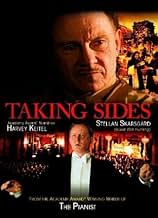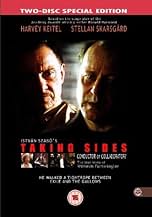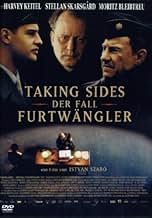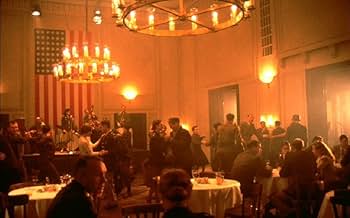Nach dem Ende des Zweiten Weltkriegs wird ein berühmter deutscher Dirigent der Loyalität gegenüber dem Naziregime beschuldigt. Er argumentiert, dass Kunst und Politik getrennt sind. Ein Ermi... Alles lesenNach dem Ende des Zweiten Weltkriegs wird ein berühmter deutscher Dirigent der Loyalität gegenüber dem Naziregime beschuldigt. Er argumentiert, dass Kunst und Politik getrennt sind. Ein Ermittler sieht das anders.Nach dem Ende des Zweiten Weltkriegs wird ein berühmter deutscher Dirigent der Loyalität gegenüber dem Naziregime beschuldigt. Er argumentiert, dass Kunst und Politik getrennt sind. Ein Ermittler sieht das anders.
- Auszeichnungen
- 9 Gewinne & 3 Nominierungen insgesamt
Handlung
WUSSTEST DU SCHON:
- WissenswertesTo the criticism of both movie critics and American audiences of depicting the American Denazification officer Maj. Steve Arnolds (Harvey Keitel) as a "caricature, a bully, a Philistine," screenplay writer Ronald Harwood told The Jewish Journal that he went on to comb archives for denazification transcripts and to interview officials who had supervised such proceedings."They were morally brutal," Hardwood stated. "They bullied people, and they did behave in an extreme way. But they had just seen the camps, and no one in the world had seen that before."
- PatzerWhen Major Arnold is listening to the recording of Beethoven's Fifth Symphony, the record finishes the first movement and carries straight on to the second. Long playing albums, which ran at 33 1/3 rpm, were introduced in 1948, but the record shown is a 78 rpm one. The performance of the 5th Symphony would have been on a set of five 78 rpm records, one movement each, split over the two sides. It should not be possible for the second movement to start without the record being changed.
- Zitate
Emmi Straube: When he made his decision, he couldn't have known everything. Especially not the way people like you do, who've returned from exile and feel that you have a right to pass judgement. Because you are blameless, you think you know best who is a sinner and who deserves forgiveness. But you have no idea how people lived here.
- VerbindungenEdited into Taking Sides Again (2004)
For example: there are frequent references in the dialogue to Furtwängler's rival, Herbert von Karajan ("Little K.") Why did the Americans attack Furtwängler, and not von Karajan, who was an ardent Nazi? Furtwängler was prevented from conducting in the U.S., while von Karajan was lionized. Perhaps the makers of this film thought that the implications of this were too big to be discussed in the film. I'm sure that they didn't even want to go near the fact that the people who ran the de-nazification program were Americans with close ties to the Nazis themselves.
Also, Furtwängler's rationale for staying in Germany was somewhat more philosophical than the film implies. He thought he was defending the legacy of Mozart, Beethoven et al against the Nazis, and that this was a sacred responsibility. A bit of this comes out in the film, but in a superficial way.
With respect to the success of the film otherwise, Stellan Skarsgaard is excellent as Furtwängler, even managing to resemble him somewhat. I think that Harvey Keitel is somewhat hampered by the script -- the film would have been more successful if Keitel had come off as more conflicted and less one-dimensional. Clearly the director wished to imply that Keitel was conflicted, but that, as a military man, he was required to toe the line -- the frequent shots of Army indoctrination films (about how bad the Germans were) were intended to provide a rationale for Keitel's behavior. But the film would have been more compelling if Keitel were given an opportunity to express more doubts about what he was being asked to do. I also thought that the ending was a bit anticlimactic.
- weed_harper
- 6. Feb. 2006
- Permalink
Top-Auswahl
- How long is Taking Sides?Powered by Alexa
Details
- Erscheinungsdatum
- Herkunftsländer
- Sprachen
- Auch bekannt als
- Taking Sides
- Drehorte
- Produktionsfirmen
- Weitere beteiligte Unternehmen bei IMDbPro anzeigen
Box Office
- Budget
- 20.000.000 $ (geschätzt)
- Bruttoertrag in den USA und Kanada
- 188.952 $
- Eröffnungswochenende in den USA und in Kanada
- 22.051 $
- 7. Sept. 2003
- Weltweiter Bruttoertrag
- 422.832 $
- Laufzeit1 Stunde 48 Minuten
- Farbe
- Sound-Mix
- Seitenverhältnis
- 1.85 : 1
Zu dieser Seite beitragen



































